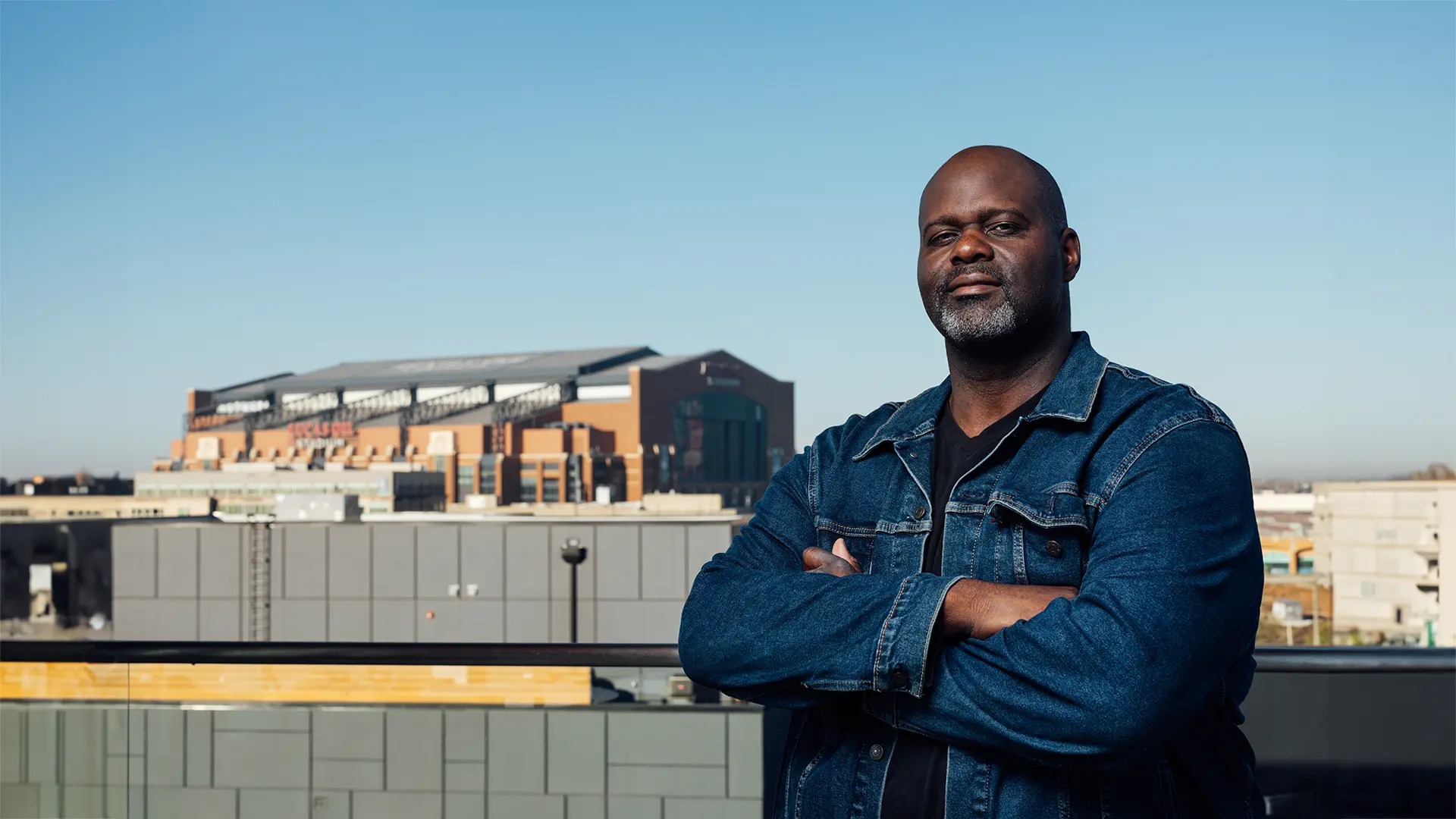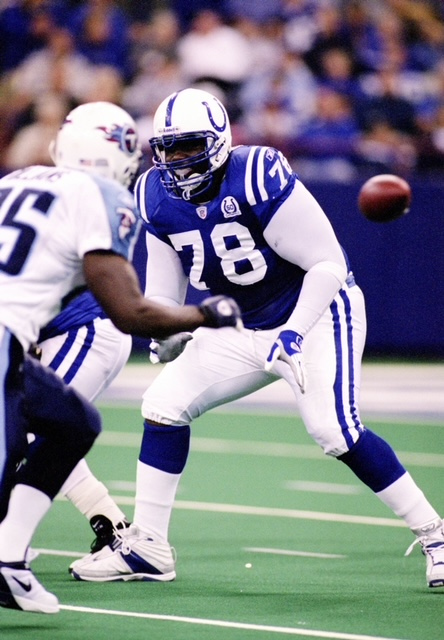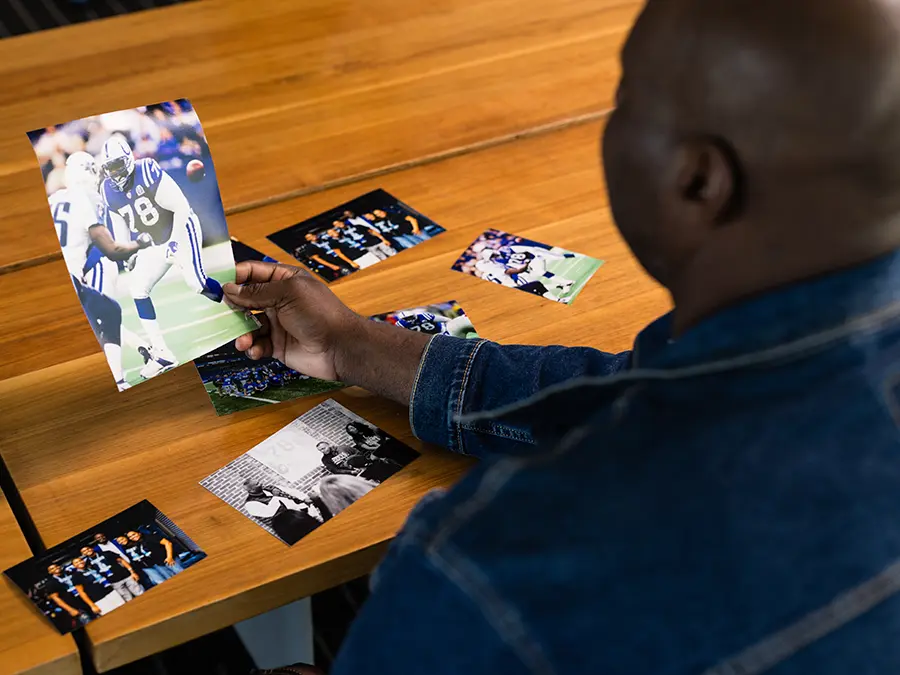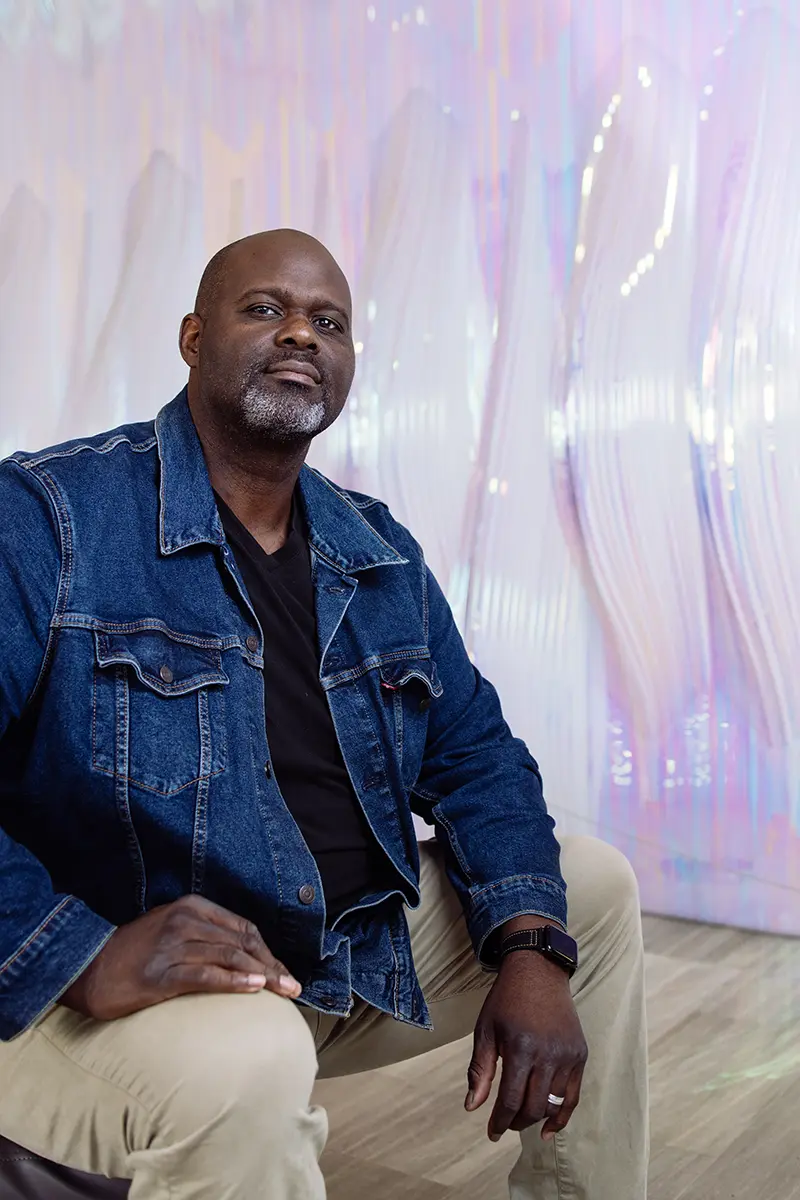
“I was able to excel professionally in sport,” says Tarik Glenn. The statement is somewhat of an undersell. In his remarkable 10-year career with the Indianapolis Colts, the former left tackle proved to be tenacious and reliable. He protected Peyton Manning, started in all 154 regular season games, played the Pro Bowl three times, and was inducted into the Colts Ring of Honor.

But transitioning to another profession? “That requires the same type of commitment and perfecting of a craft,” says Glenn. “Just because you have a passion and a heart for something doesn't necessarily translate into success or knowing how to make things work.”
Called both “ Taristotle” for being a deep thinker and “an absolute anchor” by his teammates, Glenn made a quiet but powerful impact upon his fellow team members. He built a reputation for developing players, like Reggie Wayne, on and off the field. He encouraged Wayne, for instance, to become involved in the community, which led to work with Indiana Wish Foundation.
Meanwhile, Glenn and his wife, Maya, pursued their “aligning vision” as a couple — to make an impact on the inner city, of which they were both products.
“Growing up an African American male in the early '90s, I always felt as if a part of my identity was not only being a man of faith, but also, standing and fighting for justice,” says Glenn. He studied Social Welfare at the University of California, Berkeley during his undergraduate years.
The couple started Dream Alive in Indianapolis during Glenn’s tenure in Indy. The nonprofit took its shape from his wife’s graduate capstone project for her master’s in public health. She’d conducted a needs assessment in the Mapleton/Fall Creek area of Indianapolis, and together the Glenns supported community centers that provided extracurricular activities and programming for inner-city youth, similar to what they’d experienced growing up near Oakland, California. When it became apparent that community centers weren’t the most practical way to impact kids, they partnered with Indianapolis Public Schools to provide high-impact mentoring for 7-12 graders that would help young people find a vision for their education and careers.


Their dream came to life in the midst of his football career, during which he also started — and paused — his Purdue MBA journey. Upon his retirement from football in 2006 he took on leadership of Dream Alive. Glenn's post-NFL career transition to business leader required a whole new skill set, replete with a learning curve.
“Think of the responsibility of galvanizing the community with a brand, coming up with the product — you know the services we were providing — and then leveraging the resources and raising the money to help us support the kids and the community.”
Some might assume that famous NFL players are compensated well enough to bankroll a nonprofit solo, but doing so would forego community buy-in, and Glenn wanted Dream Alive to outlast his fame and image.

“It’s hard for people to look beyond professional athletic success,” says Glenn. “I’m happy to start off by acknowledging that. At the same time, here was this young organization that really didn't have a proven brand, and we're trying to sell people on what we can do or what potentially we could do to impact the city. We didn't necessarily have a lot of success stories.” Yet. He had to create opportunities and highlight the steps the organization could take to achieve their aims and build revenue streams to fund their efforts.
Glenn leveraged his people skills, gained in his NFL years, to establish Dream Alive. Ever an indefatigable leader, Glenn met with 50 companies a year, seeking their buy-in. He wanted them to partner their staff with kids from across Indianapolis, as well as to donate funds for programming. While his career in the NFL taught him soft skills like networking and communication, he needed the technical business skills that a left tackle doesn’t often use.
“When I went to Berkeley, we just started using email,” says Glenn. He found he needed technical skills like capturing and providing quantitative and qualitative data to prove that the nonprofit was worth the investment. He needed the know-how to develop profit and loss spreadsheets, to run board meetings, to be more strategic in decision making. He had learned some of it on the fly and some from his wife, but he felt green when it came to knowing the ins and outs of managing an organization.
“I'm hiring and firing staff and needed the HR component. Just because you think somebody you know is a great person doesn't necessarily mean they have the skill set to run the organization and the programming. All of those were trial and error for me at the beginning. They were business skills I didn’t have and needed to develop.”
“Growing up an African American male in the early '90s, I always felt part of my identity was not only being a man of faith, but also standing and fighting for justice.”
Glenn began his MBA journey while he was still playing for the Colts and participating in a leadership academy in Indianapolis. One of his mentors recommended Purdue’s Weekend MBA because it would “open up future professional opportunities as well as speak to some of the challenges I was having, feeling stagnant and wanting to grow in certain areas.” Then he put the program on hold. The demands of parenting – he's dad to four kids -- and a full-time NFL career required his best.

After he and his wife moved back to California, he pivoted to a role at the UC Berkeley Athletic Study Center, where he managed and co-facilitated programs and resources focusing on the holistic development of student athletes.
“We help students navigate the academic experience and help them balance athletics and academics as they matriculate through the university. What comes with that is identifying specific competencies that student athletes need in order for them to be successful. We're always measuring how effective our work is,” says Glenn.
With his kids grown, Glenn felt it was time to finish what he’d started. He signed up for the Daniels School’s Online MBA. Accustomed to the four-hour lecture and note-taking model of learning, Glenn felt skeptical about the online modality at first. He soon found the digestible shorter recordings and case studies made it possible for him to promptly apply what he’s learning in his work context.
Mastering the art of data has been necessary in both his current role as interim director of the Athletic Study Center and in his previous nonprofit work. “We had to make the case like, ‘We need X amount of resources so we can have this amount of impact and telling the story of the type of work that we're doing.’ I've been able to apply that due to the data storytelling class,” says Glenn. “I had to be able to tell the story in a way that's visual and relatable to the audience.”
He’s also thriving in the strategy classes, calling the case studies “probably the most impactful part of my experience.”
“There are always departmental or organizational strengths, weaknesses, opportunities, threats and challenges that companies will have, whether it’s human relations or technology problems or organizational structural issues. It shines a light on some of the challenges that I've had at work, and it’s helped me formalize my approach,” says Glenn.
In his current role, Glenn leads a department that develops student athletes, some of whom may advance into professional sports, but all of whom can benefit from savvy business skills.
“I’m still working on not being quick to speak, to take the time to listen to others. It can inform what I say.”
He’s learned the value of knowing technology, whether it’s using Microsoft Teams, advanced Excel skills or other more complex applications. “It’s a whole other language you have to learn, and trying to find a way to immerse yourself in it while still playing your sport is super helpful.”
One of the most crucial skills, Glenn believes, is being able to communicate with other people in a way that meets their needs, which means, in his words, “making sure what needs to be said lands on them in a way they can understand.” This requires strong listening skills as well.
“I’m still working on not being quick to speak, to take the time to listen to others. It can inform what I say,” says Glenn.